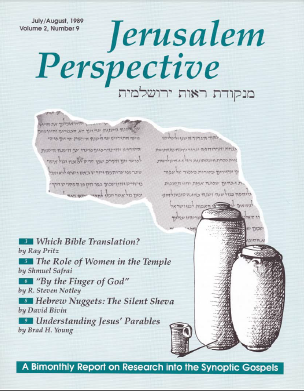How to cite this article: R. Steven Notley, “By the Finger of God” Jerusalem Perspective 21 (1989): 6-7 [https://www.jerusalemperspective.com/514/].
Revised: 6 September 2012

Jesus’ ministry of miracles and deliverance occasionally brought him into conflict with the religious establishment of his day. One of the most intriguing controversies concerned the accusation by a group of Pharisees—termed “Jerusalem scribes” in Mark’s gospel—that Jesus had accomplished the healing of a dumb man with the aid of Beelzebul, the prince of demons (Matt. 12:22-30; Mark 3:22-27; Luke 11:14-23).
Minor Agreements
In terms of synoptic relationships, it is significant to note a “minor agreement” of Matthew and Luke against Mark in this story. In Matthew and Luke Jesus is accused of casting out demons “by Beelzebul, the prince of demons.” Mark, however, records his accusers’ claim as: “He is possessed by Beelzebul, and by the prince of demons he casts out demons.” [Italics added.]
Mark’s variation is a clear example of the literary technique that Dr. Robert Lindsey has termed “Markan pick-ups.” These are differences in Mark’s account that often can be attributed to words and phrases Mark borrowed from other literary sources (e.g., Luke, Acts, the early Pauline Epistles). In this instance, Hebrew University professor David Flusser has suggested that Mark’s preservation of the claim that Jesus was “demon possessed” is taken from the accusation laid against John the Baptist found in Matthew 11:18 and Luke 7:33.
Our interest, however, is in another “minor agreement” that occurs in this story. It involves Jesus’ response to his accusers as recorded by Matthew and Luke for which there is no parallel in Mark:
But if it is by the finger [Matthew: “spirit”] of God that I cast out demons, then the kingdom of God has come upon you. (Luke 11:20; Matt. 12:28)
Jesus’ reference to the “finger of God,” אֶצְבַּע אֱלֹהִים (’etz·BA‘ ’e·lo·HIM) draws upon an expression that occurs only three times in the Hebrew Scriptures—Exodus 8:19, Exodus 31:18, and Deuteronomy 9:10.
Semitic Influence
In Greek, the construction ἐν δακτύλῳ θεοῦ (en dak·TŪ·lō the·OU, “by th finger of God,”) betrays Semitic influence. Classical Greek requires an article with the noun δακτύλῳ (dak·TŪ·lō, “finger”) governing the genitive θεοῦ (the·OU, of God). On page 135 of their Greek Grammar of the New Testament, Friedrich Blass and Albert Debrunner note:
In Hebrew the nomen regens [governing noun] would appear in the construct or with a suffix and hence would be anarthrous [without an article]. In the NT this Semitic construction makes its influence felt especially where a Semitic original lies behind the Greek (hence “translation-Semitisms”), but occasionally also elsewhere in Semitizing formulae (“Septuagintisms”).
Although scholars recognize the numerous Semitisms in Luke’s gospel, explanations vary as to whether Lukan Semitisms are a result of the evangelist’s imitation of Septuagintal Greek or whether the idioms attest to a Semitic undertext. In Exodus 31:18 the expression “finger of God” appears in connection with the inscription of the Torah upon stone tablets. There, as in Luke 11:20, “finger” appears in the instrumental case, בְּאֶצְבַּע אֱלֹהִים (be’etz·BA‘ ’e·lo·HIM, “by the finger of God”). Yet, in the Septuagint’s translation of Exodus 31:18, “finger” is not anarthrous, but occurs in good Greek style, with the article—τῷ δακτύλῳ τοῦ θεοῦ (tō dak·TŪ·lō tou the·OU, literally, “by the finger of the God”).
If the Semitism of Luke 11:20 is a result of Luke’s imitation of the Septuagint’s style, as most scholars claim, then how is it that Luke’s idiom is more Hebraic than the Septuagint upon which he supposedly relies? The evidence suggests that this is not a Septuagintism but, in Blass and Debrunner’s words, a “translation-Semitism.” Luke’s text seems to rest upon a literal translation of a Hebrew source.
Rabbinic Commentary
The expression “finger of God” also occurs in a passage from an ancient rabbinic commentary on Exodus that is recited in Jewish homes every year as part of the Passover Haggadah:
Rabbi Yose the Galilean said, “How do we know that the Egyptians were afflicted with ten plagues in Egypt, but with fifty at the Red Sea? Of Egypt it is said: ‘Then the magicians said to Pharaoh, “This is the finger of God.”’ But of the Red Sea it is said: ‘And Israel saw the mighty hand….’ With how many plagues were they afflicted by the ‘finger’? Scripture says with ten. Therefore we may conclude that in Egypt the Egyptians were afflicted with ten plagues, but at the Red Sea with fifty.” (Mechilta, Beshallah 6; to Exod. 14:31)
The first-century sage’s attempt to enlarge upon the greatness of the Lord’s deliverance of Israel from its slavery in Egypt underscores the importance of this event in the Jewish faith. Those who heard Jesus’ reference to the “finger of God” would have recognized the subtle intimation to God’s redemptive act.
Jesus responds to his accusers that if God is responsible for the liberation of the dumb man from his bondage to Satan, then God’s kingdom has been established in their midst. In this brief New Testament passage we can hear not only the Hebraic words of Jesus—בְּאֶצְבַּע אֱלֹהִים (be’etz·BA‘ ’e·lo·HIM)—but also his understanding of the redemptive significance of his movement that he chose to call the kingdom of God.
































































































